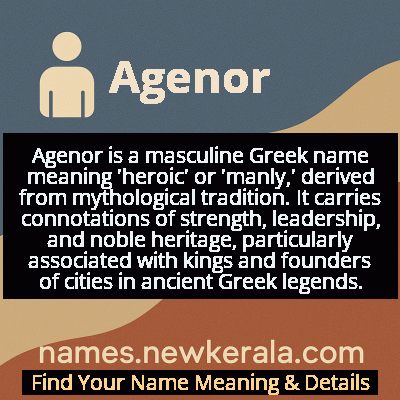Agenor Name Meaning & Details
Origin, Popularity, Numerology Analysis & Name Meaning of Agenor
Discover the origin, meaning, and cultural significance of the name AGENOR. Delve into its historical roots and explore the lasting impact it has had on communities and traditions.
Name
Agenor
Gender
Male
Origin
Greek
Lucky Number
6
Meaning of the Name - Agenor
Agenor is a masculine Greek name meaning 'heroic' or 'manly,' derived from mythological tradition. It carries connotations of strength, leadership, and noble heritage, particularly associated with kings and founders of cities in ancient Greek legends.
Agenor - Complete Numerology Analysis
Your Numerology Number
Based on Pythagorean Numerology System
Ruling Planet
Venus
Positive Nature
Harmonious, responsible, caring, and artistic.
Negative Traits
Overly idealistic, superficial, possessive, or jealous.
Lucky Colours
Pink, turquoise.
Lucky Days
Friday.
Lucky Stones
Diamond, turquoise.
Harmony Numbers
2, 3, 9.
Best Suited Professions
Artists, musicians, teachers, healthcare workers.
What People Like About You
Warmth, nurturing nature, artistic flair.
Famous People Named Agenor
Agenor of Phoenicia
Mythological King
Legendary Phoenician king, father of Europa and Cadmus, founder of Thebes
Agenor of Argos
Mythological Hero
Son of King Triopas, known for his role in Argive legends and genealogies
Agenor of Troy
Mythological Warrior
Trojan hero who fought against Achilles in the Trojan War, son of Antenor
Agenor the Grammarian
Scholar
Ancient Greek grammarian and scholar mentioned in historical texts
Name Variations & International Equivalents
Click on blue names to explore their detailed meanings. Gray names with will be available soon.
Cultural & Historical Significance
Extended Personality Analysis
The name Agenor evokes personality traits of regal authority, protective instinct, and visionary leadership. Individuals with this name are often perceived as natural leaders who combine strategic wisdom with decisive action, much like the mythological king who commanded respect across multiple city-states. They typically exhibit strong paternal qualities, showing deep concern for their family's welfare and legacy, reflecting Agenor's relentless search for his abducted daughter Europa. This protective nature extends to their communities, where they often take on roles as guardians and mentors. The name also suggests a pioneering spirit and intellectual curiosity, inspired by Agenor's children who became explorers and city founders. These individuals tend to be both traditional and innovative—respecting established customs while being willing to venture into new territories. Their personality often blends practical governance with mythological grandeur, making them capable of both everyday leadership and extraordinary undertakings. The combination of sea-god ancestry and royal lineage in the myth suggests someone who can navigate both emotional depths and political complexities with equal skill.
Modern Usage & Popularity
In contemporary naming practices, Agenor remains an exceptionally rare choice, primarily preserved within academic circles, Greek diaspora communities, and families with strong classical education backgrounds. The name's usage reflects a deliberate selection rather than following popular trends, often chosen by parents seeking a distinctive name with profound mythological and historical resonance. While it doesn't appear on mainstream baby name charts in English-speaking countries, it maintains a quiet presence in Greece and among Hellenic communities worldwide. Recent years have seen a modest revival of classical names, potentially increasing Agenor's visibility among parents looking for unique alternatives to more common Greek names like Alexander or Theodore. The name's complexity and strong mythological associations make it particularly appealing to educated, culturally-conscious families who appreciate its depth and distinctiveness. Its rarity ensures that bearers stand out while carrying a name rich with cultural heritage and legendary significance.
Symbolic & Spiritual Meanings
Symbolically, Agenor represents the archetype of the civilization-bringer and cultural bridge between worlds. The name embodies the concept of dynastic foundation and the transmission of cultural values across generations and geographic boundaries. As the mythological figure whose children spread across the Mediterranean founding cities and establishing new societies, Agenor symbolizes the generative power of leadership and the enduring nature of legacy. His connection to both Poseidon (the sea) and terrestrial kingdoms represents the balance between different realms of power and influence. The name carries connotations of search and recovery, reflecting his quest for his daughter Europa, making it symbolic of perseverance and familial devotion. Agenor also represents the intersection of myth and history—a figure who bridges the legendary past with the foundation of historical cities and civilizations. This makes the name symbolic of continuity, where mythological origins give rise to tangible cultural achievements and enduring institutions that shape human civilization.

